A faulty alternator will result in a dead battery and other vehicle issues, or worse, a dead car in the middle of the road. Fortunately, we are here to share what we discovered and tell you the symptoms of a bad alternator and how long it will take you or the repair shop to have it replaced.
An alternator replacement in a repair shop typically takes about 2 hours. If you decide to replace your alternator yourself, it will take around 3 to 4 hours, depending on your skills and knowledge.
Continue reading to learn more about the alternator in your car. We'll also go over the causes and symptoms of a failing alternator and how to install and maintain it.
![Mechanic or worker hand-holding wrench repair car alternator in a garage. Repairing and maintenance automobile concept - How Long Does It Take To Replace An Alternator [Inc. DIY & At Repair Shop]](https://vehq.com/wp-content/uploads/2022/11/Mechanic-or-worker-hand-holding-wrench-repair-car-alternator-in-a-garage.-Repairing-and-maintena.png)
How Long Does It Take To Replace An Alternator?
Replacing the alternator is usually simple and requires little mechanical knowledge and standard tools.
It will only take about 2 hours to replace your alternator if you take your car to a professional mechanic. However, it will cost you a lot of money, the price of the alternator will vary depending on the model and the year of your car, but it ranges between $100 to $400, plus labor costs that are quite expensive.
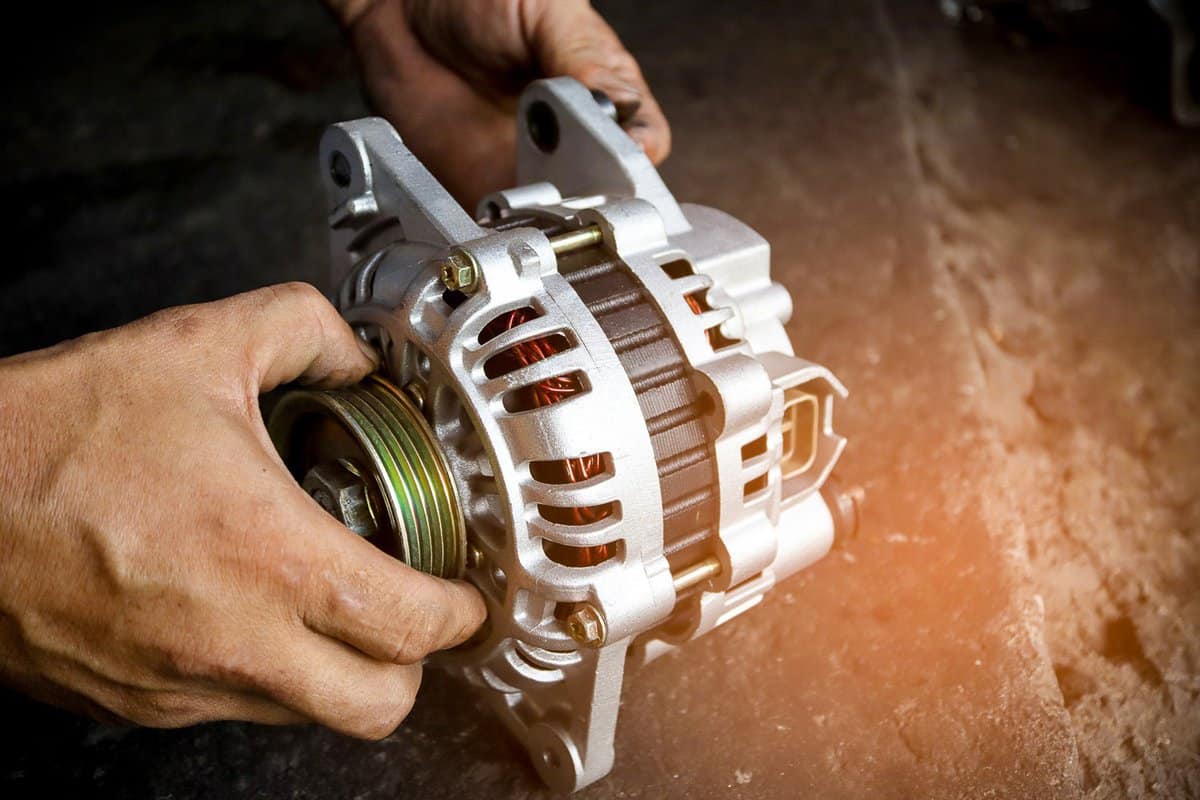
If you don't have the money to take your car to a repair shop but have the necessary skills, knowledge, and tools, you can replace your alternator in your garage. It can take 3 to 4 hours to complete, but this depends mainly on your skill set and if you have the right tools to do the job.
Check this Alternator on Amazon.
How Does An Alternator Work?
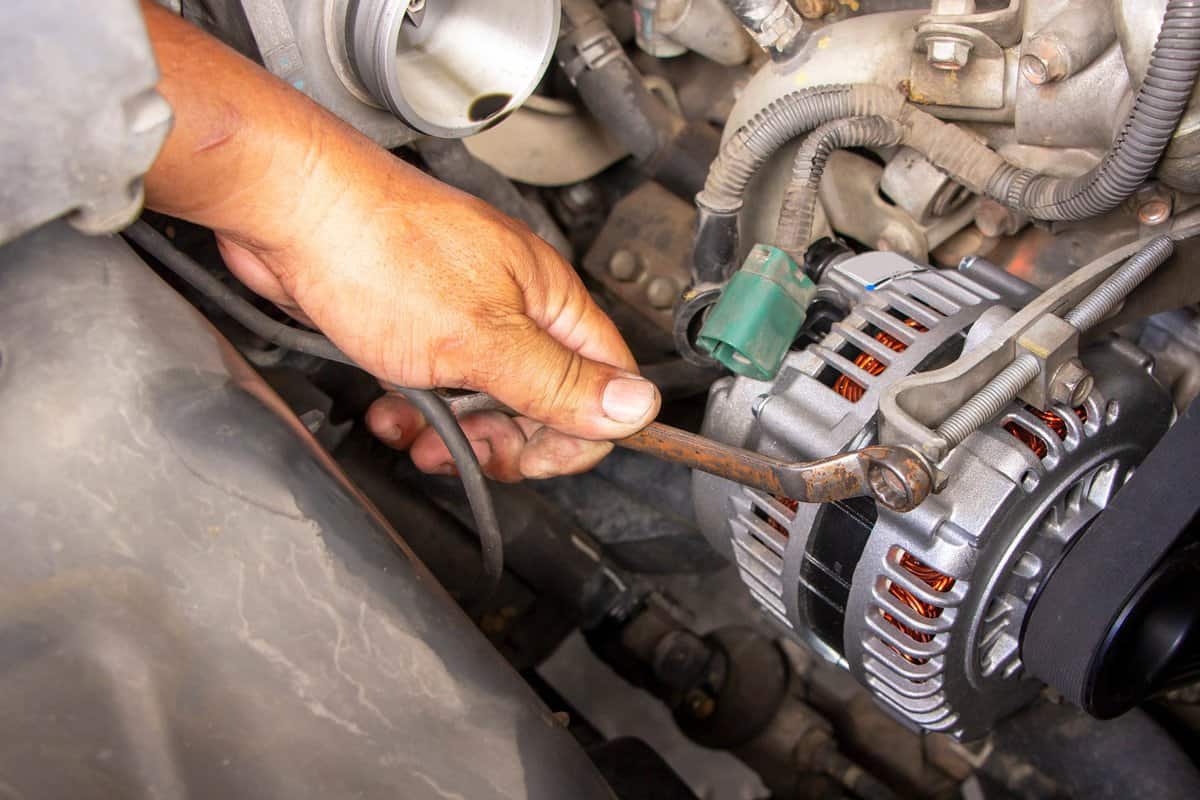
The alternator generates electrical energy by converting mechanical energy. When you start your engine, it powers a drive belt attached to an alternator pulley. The pulley rotates the rotor shaft of the alternator, which rotates a set of magnets around a coil.
These rotating magnets generate alternating current around the coil, then routed to the alternator's rectifier. The rectifier converts the alternating current power into direct current power, which powers your vehicle's electrical systems.
What Are The Common Causes Of Alternator Failure?
The alternator is a component of the starter system that can be damaged in a variety of ways, including:
Using Jumper Cables Incorrectly
Jumping the vehicle and reversing the polarity of the jumper cables will result in immediate damage, especially to the computer-controlled regulator and diodes. Furthermore, the jumping process generates current surges that can damage the car's alternator.
Oil Leaks
Oil leaks will also reduce the life of an alternator, so get them fixed immediately. The amount of oil required to cause the alternator to fail is difficult to predict. Oil leaking from leaking valve cover gaskets, on the other hand, can cause the alternator to fail.
Belt Misalignment, Tightening, and Loosening
If the friction on your drive belt is not correct, your alternator will malfunction and fail. The growling or whining sound will immediately notify you of this.
What Are the Symptoms Of A Bad Alternator?
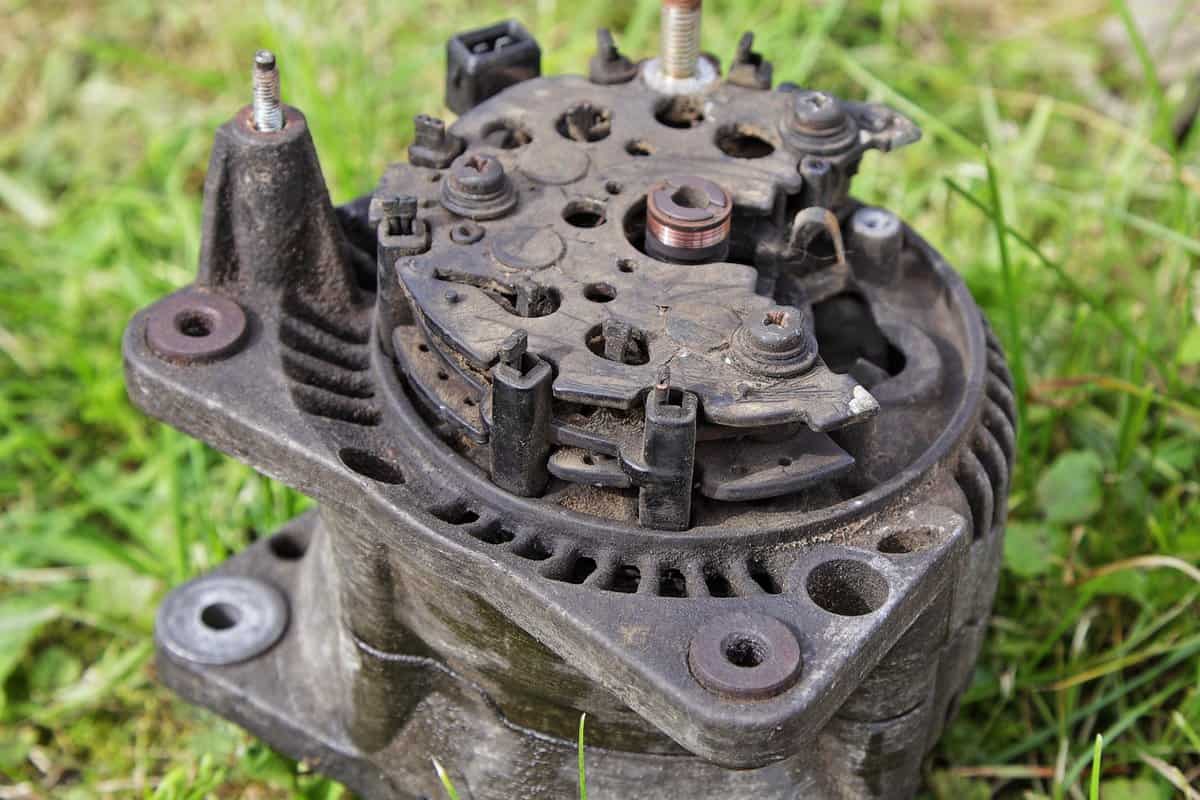
If the alternator fails, your car will not start or run for more than a few minutes. Any warning signs listed below may indicate a problem with your alternator.
Dead Battery
A faulty alternator will not adequately charge the battery while the engine is running, causing the battery's charge to deplete faster than usual. Jumpstarting the car is one method to determine whether the problem is with the battery or the alternator.
If you jumpstart your vehicle and it continues to run, your battery may need to be replaced soon. If you jumpstart the car and it dies soon after, it could be because your alternator isn't delivering enough power to the battery.
Engine Stalling
If your engine doesn't start, it could be because your alternator isn't charging the battery. As a result, when you turn the key in the ignition, you hear a troubling clicking noise rather than the purr of your engine.
If your vehicle often stalls while driving, it could be because the spark plugs and coils aren't receiving enough power from the alternator to keep the engine running.
Unusual Sounds
Bad alternators frequently make unusual or loud noises. A belt transfers mechanical energy from the engine to the alternator. If your belt is excessively worn or misaligned, you may hear strange squeaking sounds from under your hood. A worn belt may prevent the alternator from producing sufficient power.
Bearings on the inside of the alternator enable the internal stator to spin in sync with the belt. These bearings become pitted and worn over time, causing a humming sound. This sound becomes louder as the bearings deteriorate.
Electrical Issue
A failing alternator can cause a variety of other electrical problems. In general, such problems manifest as an inability to operate at total capacity.
For example, you might notice that your headlights are dimmer than usual or that their brightness varies inexplicably. Dash and dome lights that flicker or appear dim are also indicators. Windows that operate automatically may open and close much more slowly than usual.
Burning Smell
A burning rubber or wire odor could imply that parts of your alternator are wearing out. Since the alternator's drive belt is constantly under friction and tension and is so close to the hot engine, it may eventually wear out and release an unpleasant burning rubber odor.
When an alternator is overused or overworked, it attempts to push too much electricity through its wires, causing them to overheat and become dangerously hot. Damaged wires also cause interruption to electricity flow, causing the wires to overheat and release a terrible smell.
How To Replace Your Alternator?
An alternator can be expensive to replace at a repair shop, but it can be done in your garage. You can replace it with a handful of tools and a few hours, keeping your money in your pocket. Below is a simple rundown of a DIY replacement of a car alternator.
Step 1-Disconnect The Negative Battery Cable.
You're likely to ground a live wire if you don't disconnect the battery. To avoid any further damage to the alternator and other electrical components of your vehicle, make sure that the negative battery cables are detached.
Step 2-Loosen The Belt Tensioner And Remove The Belt
To loosen the belt, use a belt tensioner tool to spring back the belt tensioner. Remember how the belt is attached to the other components because you'll need to reroute the belt around all of the engine's pulleys once you're done.
Step 3-Disconnect All Wiring From The Alternator And Remove The Old Alternator
Disconnect the alternator's connectors and wiring. Remove the alternator by unbolting it. You may have to maneuver it carefully around other parts of your vehicle.
Compare the old and new alternators. Ensure all of the connection ports and bolt holes are the same size. If anything appears out of place, return the new alternator and obtain the proper replacement.
Step 4-Install The New Alternator
Install the new alternator, reconnect any loose connections, and tighten all the bolts. Install the drive belt by positioning it and rotating the belt tensioner. Finally, attach the negative battery cable.
How Long Does An Alternator Last?
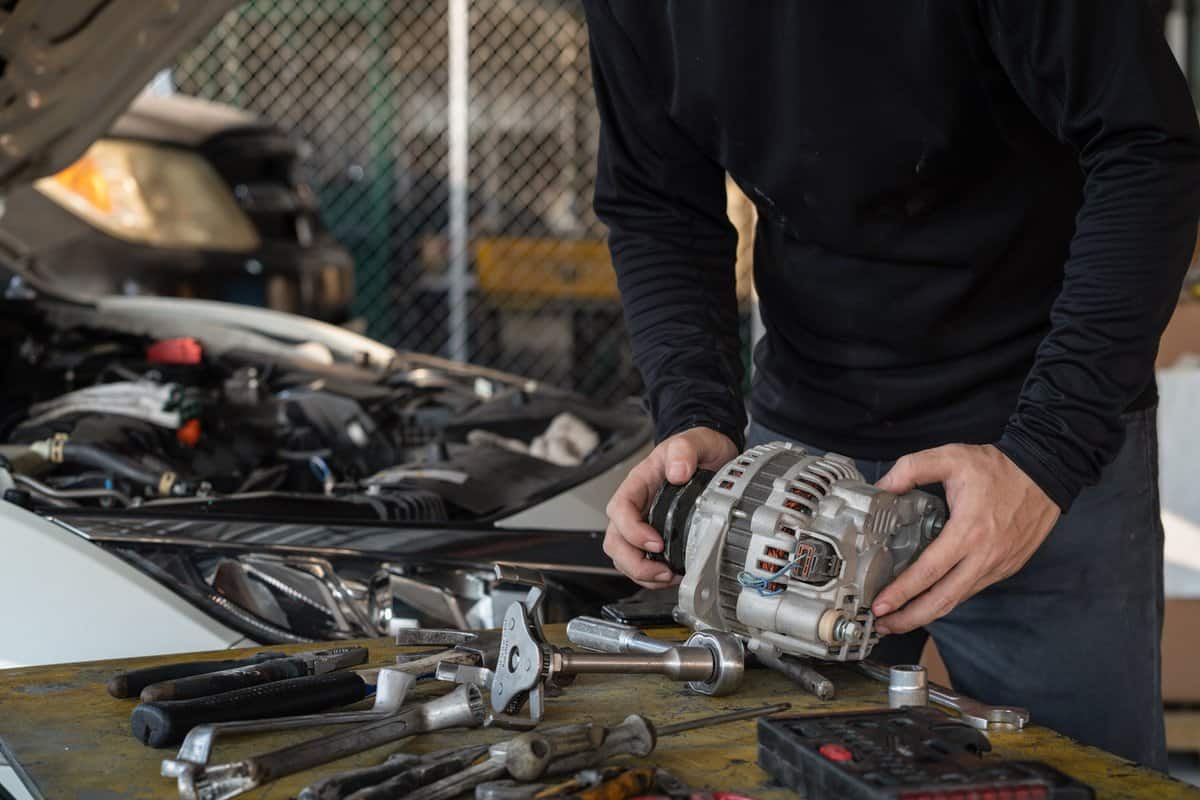
Alternators last longer than car batteries. The alternator has a 7-year average lifespan. However, it depends on how often you drive your vehicle. Most vehicles need to replace their alternator between 80,000 and 150,000 miles.
How To Test Your Alternator?
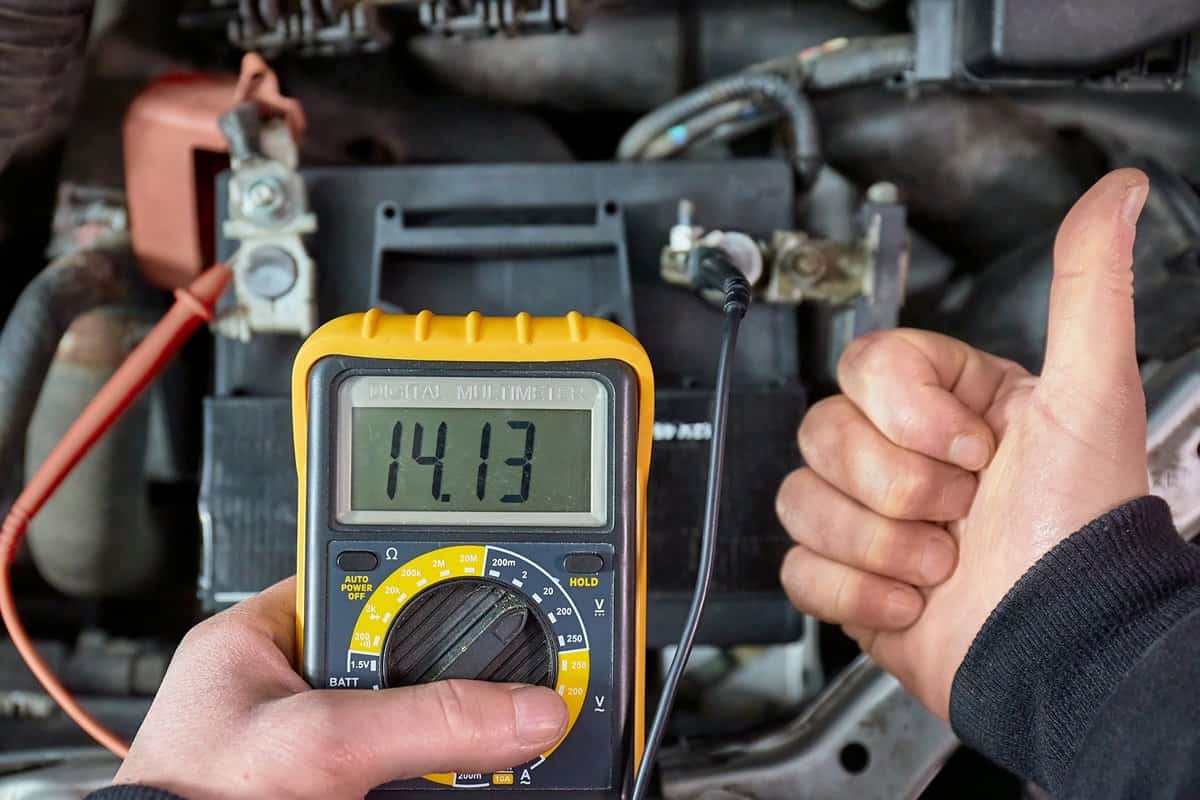
You should start by testing your battery, then inspect the drive belt, alternator pulley, and drive belt tensioner. If all of those are clear, test the alternator by measuring the battery's voltage with a multimeter. When the engine runs, the voltage should be between 13.8 and 14.2 volts. Maintain this range even while the engine is revving.
Check this Digital Multimeter on Amazon.
Tips On How To Maintain Your Alternator
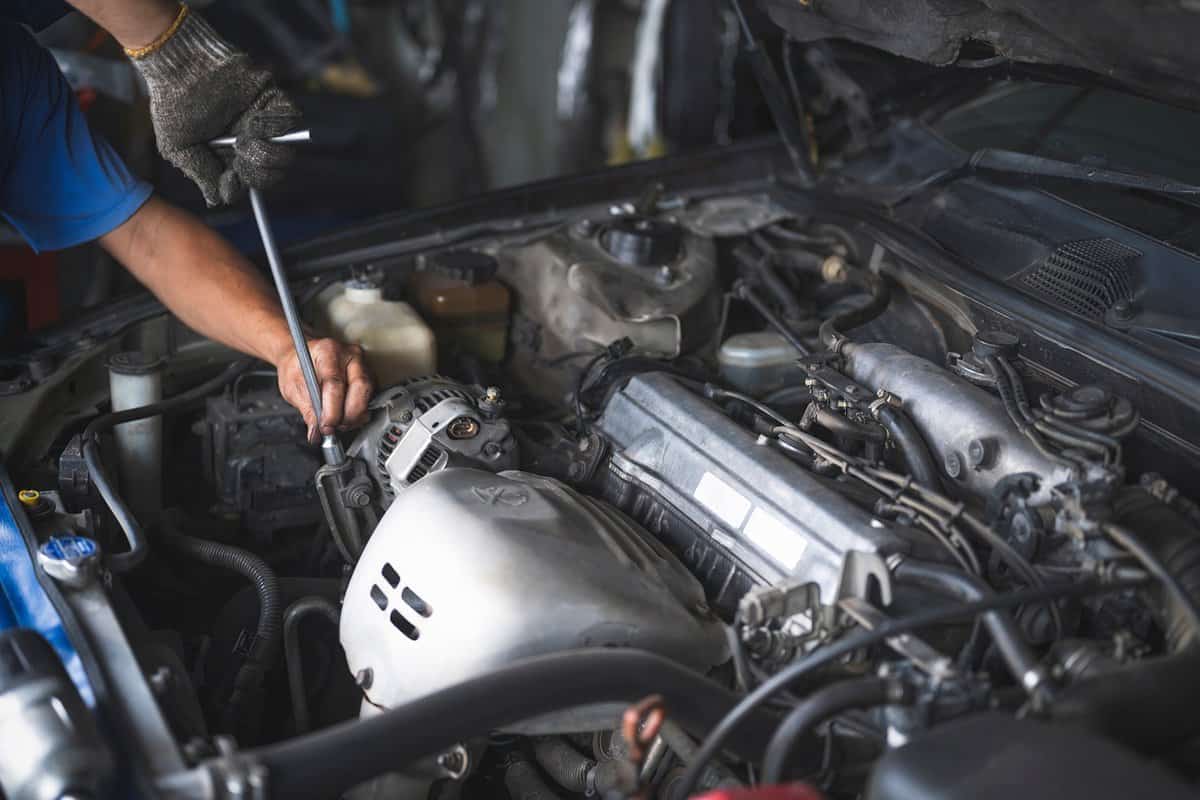
Since your alternator is at the heart of your vehicle, performing routine maintenance is essential to keep it in good working order.
Regular Maintenance
By having your vehicle serviced regularly, you are letting your mechanic check the parts of your vehicle, including the charging system, and identify any repairs or replacements needed before they go wrong or cause further damage.
Select The Correct Belt
Examining the belt is one of the most important steps in ensuring the longevity of an alternator. A belt will wear down and crack over time because it is made of rubber, typically between 60,000 and 100,000 miles.
That is why, when performing routine maintenance, it is critical to inspect the belt. Replace it as soon as you notice the first signs of aging, as it can cause engine damage.
Maintain Its Alignment
Remove All Grime, Dust, And Debris
An excellent engine performs well. Your alternator is no exception. If it becomes overheated, it will slow down. It may die if not treated immediately.
Keeping the alternator clean is the key to preventing this situation. Inspect the engine for grime, dust, or debris, and clean it away if you find any. If this sign is evident, it is possible that air is not getting to the alternator.
It's A Wrap!
An alternator takes about 2 hours to change in a repair shop and 3 to 4 hours on your own. When replacing an alternator, make sure to use high-quality original parts.
You should also maintain your car's alternator so that it lasts as long as possible and you can enjoy riding in it. Always keep an eye on your vehicle; if you notice anything wrong, take it to your trusted car service center immediately for an inspection.
You've made it to the end! Here are a couple of other articles you might find helpful:


